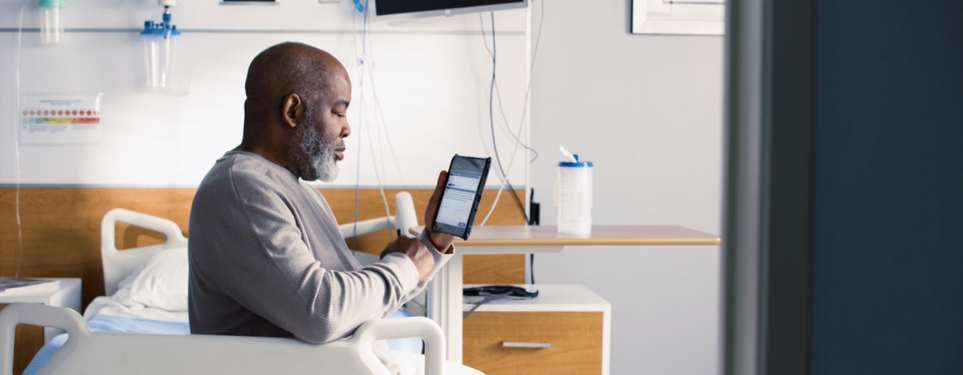June 13, 2024
Mobility Technology in Healthcare: A New Era of Patient Care

In recent years, mobility technology has rapidly and radically transformed healthcare, offering unprecedented opportunities to enhance health outcomes, streamline operations and offer a better patient experience. This has been led by the adoption of several pillars including:
- Wearable health devices
- Telemedicine platforms
- Mobile health apps
These technologies play a vital role in transforming the healthcare landscape, making healthcare more accessible, personalized, and efficient. According to a report by Mordor Intelligence, the global healthcare mobility solutions market is projected to grow from USD 135.43 billion in 2024 to USD 335.93 billion by 2029, highlighting the increasing importance and integration of mobility technologies in health systems.
Streamlining Operations: Solving Efficiency Challenges in Healthcare with Mobility Technology
The introduction of mobility technology in healthcare has revolutionized traditional practices, addressing long-standing inefficiencies. Comprehensive federal data indicates that almost all acute-care hospitals and a vast majority of office-based physicians have implemented electronic health record (EHR) systems. These systems form the backbone of healthcare mobility, offering several key advantages:
- Enhanced Data Management: Digital health records streamline the accessibility and sharing of patient information among healthcare professionals, drastically reducing the time previously spent on manual data entry and record keeping.
- Automation of Routine Tasks: This technology minimizes the administrative burden on healthcare staff by automating tasks, which frees up time for patient care and significantly reduces the potential for human error.
- Improved Communication: Mobility solutions foster enhanced communication across various departments, facilitating a more coordinated care approach and preventing delays that can affect patient outcomes.
Addressing Immediate Health Monitoring Needs with Tablets, Phones and Wearable Devices
The addition of tablets, phones and wearable devices are leading the charge in mobility technology. Dr. John D. Halamka, Chief Information Officer at Beth Israel Deaconess Medical Center, has highlighted the transformative impact of digital tools, stating that “digital healthcare is more than just digitizing existing workflows; it’s about redefining healthcare delivery.” These devices provide numerous benefits:
- Real-Time Health Monitoring: These devices allow continuous monitoring of patients’ vital signs, enabling healthcare providers to react swiftly to any emergent conditions.
- Remote Patient Monitoring: Vital data is transmitted in real-time to healthcare teams, allowing for proactive management of patient health, particularly for chronic conditions, and facilitating early intervention.
- Empowerment Through Technology: By equipping patients with health monitoring devices, they can actively participate in their health management, leading to better health outcomes.
- Diverse Applications: The range of devices available—from electronic blood pressure monitors to sophisticated biometric monitors—creates suitable options for various patient needs, integrating technology into everyday healthcare practice.
Telemedicine Platforms: Transforming Patient-Provider Connections
Telemedicine platforms have revolutionized how medical care is delivered, especially benefiting those in remote or underserved areas. Over 80 percent of physicians now incorporate smartphones and telemedicine in their practice, providing:
- Efficient Resource Use: These platforms help optimize healthcare resources, reducing the need for physical office space and minimizing travel requirements for patients and providers.
- Enhanced Patient Satisfaction: The convenience, timeliness, and accessibility of care offered through telemedicine improve overall patient satisfaction and engagement.
Mobile Health Apps: Customized Care at Your Fingertips
Mobile health apps are tailor-made to enhance the patient-centered nature of mobility technology in healthcare, providing:
- Customized Care Solutions: Apps offer specific functionalities, such as medication reminders, mental health support, and personalized wellness tracking, adapting to each user’s unique health needs.
- Empowerment and Accessibility: These apps empower patients with knowledge and tools right at their fingertips, fostering an environment where they can actively manage and improve their health.
These apps not only empower patients with valuable health insights but also improve accessibility, making health management more direct and personalized.
Mobility Technology in Healthcare: A Strategic Imperative
Mobility technology represents a paradigm shift in healthcare, redefining standards of patient care and operational excellence. Integrating mobility technology is essential for healthcare providers looking to meet the expectations and demands of modern patients. Key components like tablets, phones, wearable devices, telemedicine, and mobile health apps herald a future of healthcare that is more accessible, personalized, and efficient. Partnering with a full-service mobility solution provider is recognized as the best practice for adapting to this transformative trend.
The Compelling Case for Mobility Technology in Healthcare
By embracing mobility technology, healthcare providers can significantly enhance the efficiency of their operations and the quality of care they provide, making healthcare more accessible and tailored to individual needs. This integration improves patient outcomes and drives the healthcare industry forward into a more efficient, effective, and patient-centered future.
About the Author:

Tony Fernandez is the CEO and President of MTech Mobility, a global leader in providing comprehensive lifecycle and repair services for devices a global full-service mobility and technology solutions provider, which he founded in 2012. He is responsible for developing the vision and strategy for the company’s service offerings, as well as for its customer- and partner-focused approach. With a career spanning more than 30 years, Tony has spearheaded IT managed services and operations for numerous industries (including retail, hospitality, travel, healthcare, and entertainment), providing leadership roles at Amadeus, a major Spanish IT provider for the global travel and tourism industry, as well as NCR Corporation, a leading software- and services-led enterprise provider.
Download eBook: How Healthcare Teams Can Leverage Digitized Forms
[av_button label=’Download eBook’ link=’manually,https://interlaceclone.flywheelstaging.com/portfolio-item/ebook-how-healthcare-teams-can-leverage-digitized-forms//’ link_target=’_blank’ size=’large’ position=’center’ label_display=” title_attr=” icon_select=’no’ icon=’ue800′ font=’entypo-fontello’ color=’theme-color’ custom_bg=’#444444′ custom_font=’#ffffff’ id=” custom_class=” av_uid=’av-o6t61m’ admin_preview_bg=”]
